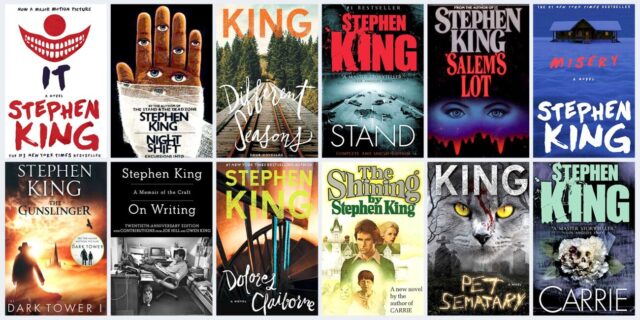We deal with writing daily. Emails, comments, blog posts, essays ‒ in one way or another, we dive into the craft of telling something via text. While professionals will help you with academic challenges, creative writing is something that you must master independently. Why not learn from the best, then?
While looking for writing tips, I stumbled upon NoCramming, which got me thinking: If there are resources to help with essays, surely there’s a way to channel my love for books into a blog. And guess what? There is!
Stephen King is a bright example of a successful contemporary writer. The world knows his stories, many of which turned into blockbuster movies. In this article, we’ll share tips and tricks on how to work as the renowned master of horror.
Brainstorm Ideas for Your Story

Every good story starts with an idea. The sources of inspiration are numerous, and they may take unpredictable forms:
- A dialogue from a movie;
- A well-crafted digital art;
- A sudden emotion or a memory;
- Personal experience or a story;
- Another fiction novel.
Mixing and combining inspirations will give you a solid idea for your story.
When you have something to write about, try a bit of experimenting. Freewriting is another efficient brainstorming technique. Just start writing whatever comes to your mind: scenes, characters, situations. Let yourself loose and see where inspiration will take you.
Usually, we are caught in the art block and struggle against the fear of blank pages. To avoid that, you must train yourself to start writing no matter the circumstances. Freewriting is not your fictional story and not even a draft. This technique will help you warm up and develop decent writing pieces.
Develop Characters and Plot of the Story

You learn how to craft a decent plot and characters as long as you write stories. There is always some aspect to improve or a technique to apply. Here, we will provide basic storytelling concepts that Stephen King uses in his books.
Start with characters. Are they young or old? Intelligent or brute? Motivated or lazy? Characters represent our thoughts and ambitions on the paper. Do not be afraid to explore unfamiliar topics and make characters and experiences outside your comfort zone.
In most of Stephen King’s stories, characters are regular people in unusual circumstances. They have both positive and negative traits, which come into struggle when the unpredictable reality knocks on their doors.
A plot of a story builds around conflicts. Conflicts, in turn, emerge from the character’s desire and their inability to fulfill their wish. For example, in the short story 1408, Mike Enslin first tries to enter the room, but the hotel’s manager denies him (conflict). Then, he tries to escape the cursed room (another conflict). And from such pieces, a story emerges.
Conflicts are always about something exciting. You don’t have to write how your character wants oatmeals for breakfast but finds none in the fridge. Such a conflict does not contribute to a story unless your character goes on a daring adventure to get these oatmeals. Skip the mundane parts and focus only on thrilling experiences where characters have something to lose in the conflict.
Yet, stories do not consist solely of conflicts. Your readers need to know your characters better, and characterization helps you do that. When you create characterization, you show the character’s features, strong and weak sides, and demeanor.
Characterization may be subverted or supported via conflicts further in the story. Yet, the clear image of your characters will immerse readers deeper into the story.
Show, Don’t Tell
Show, don’t tell is another paramount rule of storytelling that Stephen King often uses. In short, this principle implies that when you describe something, you must provide an immersive experience rather than simple narration.
When your characters are in stressful situations, describe what they feel and how their body reacts. Visceral descriptions will help you get under the characters’ skin and live through a tense moment with them.
The same goes for locations and settings: smells, sounds, colors ‒ every little detail contributes to immersion.
Finally, you should depict the conflict and the character’s behavior. Their body language, tone of voice, gestures, and expressions will help make a scene in the reader’s imagination more vivid.
Find Your Voice

Stephen King is a renowned master of horror. His stories, short and long, have been sending chills down readers’ spines for more than several decades. Yet, if you want to write like Stephen King, you don’t have to stick to the horror genre.
Finding your voice is not an easy task. When you begin to write, you consciously or subconsciously copy the style of your favorite writers. It is a normal process. Point out what exactly you like and dislike about a particular author. This approach will help you develop your unique style that combines the best traits of your favorite fiction.
Develop a Routine
Stephen King has written sixty-five novels, five non-fiction books, and over two hundred short stories. Besides, he worked on screenplays and adaptations of his books to the movie screen. Stephen King’s secret is simple: he writes every day, with no exception.
He writes at least five pages per day, no matter the weather, his mood, or morning news. This feat may seem simple, but it helps create masterpieces—persistent, dedicated work over the fiction.
Start with something small. Get used to finishing your stories, even if they are five pages long. The habit of finishing your work will help you push further. Find a time in your schedule dedicated solely to writing: no distractions or external factors.
For example, you dedicate an hour a day strictly to fiction writing or related exercises. This training will help you hone your skills and achieve your writing ambitions.
Final Words
Unlike creative, academic writing can be challenging and exhausting. It is better to trust responsible tasks to professionals. When you have more time, you can spend it on writing that you enjoy and craft a story of your dream.
Secrets of the masters are simple: persistence, dedication, and attention will help you write a story even better than one of Stephen King’s. Read the summary of A Good Mariage by Stephen King.










